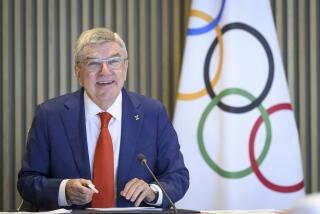Kenya’s Mukora Quits the IOC
- Share via
LAUSANNE, Switzerland — Charles Nderitu Mukora of Kenya, alleged to have received direct cash payments of nearly $70,000 from the Salt Lake City and Sydney bid committees, announced his resignation from the International Olympic Committee on Wednesday in Nairobi, becoming the fourth IOC member to quit in the wake of the Olympic bribery scandal.
Mukora, 64, was one of six IOC members expelled Sunday as the organization completed its in-house investigation of the Salt Lake City 2002 bid campaign. Senior IOC officials expect the expulsions to be ratified by an all-members’ vote in March.
According to the report issued by the IOC’s inquiry panel, Mukora accepted direct payments totaling $34,650 from the Salt Lake City committee “for his personal benefit” and “has been unworthy of and jeopardized the interests of the IOC in a manner incompatible with the duties and obligations pertaining to his membership.”
Days earlier, John Coates, president of the Australian Olympic Committee, released documents showing he had offered Mukora and Ugandan IOC member Maj. Gen. Francis Nyangweso each payments of $35,000 on the eve of the vote to determine the host city for the 2000 Olympics. Coates said the money was to aid sports programs in Kenya and Uganda.
Sydney won the election, held in Monaco in 1993, by two votes over Beijing, 45-43, the day after the payments were made.
Talking with reporters in Nairobi, Mukora denied any wrongdoing.
“I was an innocent victim of circumstances,” he said. “However, the president of the International Olympic Committee has advised us to tender our resignations before March 17-18 in order to put these allegations to rest.
“I have decided, therefore, to accept his advice on principle.”
Mukora, an IOC member since 1990 and chairman of the Kenya Olympic Assn., said he told the IOC inquiry panel that he had taken no money personally and used the payments to finance “sports development in Kenya” and “world youth sports activities.”
“I have never been party to any improper dealings in the last 40 years I have been involved as a volunteer or as an IOC member,” Mukora said.
“The moneys that I am alleged to have received as regards to Salt Lake City were moneys paid toward the establishment of high-altitude training camps . . . and I have not used the moneys for my personal use or personal purposes.”
Mukora became the fourth IOC member to resign in the last week, following Pirjo Haggman of Finland, Bashir Mohamed Attarabulsi of Libya and David Sibandze of Swaziland.
His resignation reduces the list of IOC members recommended for expulsion to five: Agustin Arroyo of Ecuador, Jean-Claude Ganga of the Republic of Congo, Zein El Abdin Ahmed Abdel Gadir of Sudan, Lamine Keita of Mali, and Sergio Santander Fantini of Chile.
Three other members remain under investigation by the IOC: Louis Guirandou-N’Diaye of the Ivory Coast, Kim Un-Yong of South Korea and Vitaly Smirnov of Russia.
All told, seven African IOC members have been implicated in the scandal, which has led to charges of IOC bias and unfairness by several African sports officials.
Jean Claude Ndalla, former sports minister of the Republic of Congo, told the Associated Press that the IOC investigation “smacks of a conspiracy against Africans.” Robert Magagula, vice president of the Swaziland Olympic Committee, added that “lavish gifts were presented . . . to all IOC members, not just African members.”
Magagula said the IOC’s $150 limit on gifts was all but ignored by bid committees courting IOC votes.
Once the limit was adopted by the IOC, he added, gifts were presented secretly to IOC members after midnight by bid committees “instead of being rolled on a trolley through a hotel lobby at noon. That happened to all IOC members, not just African members.”
At least two of the targeted African IOC members say they are going to fight to stay in the organization.
In television interviews over the weekend, Ganga adamantly maintained his innocence, saying he would never resign from the IOC.
Keita told the Swiss publication Le Matin, “I’m a fighter by nature, not someone who resigns. I’m going to defend myself. The statutes give me the right.”
Sibandze, who tendered his resignation Sunday, held a news conference Wednesday to address charges in the IOC Commission report that he accepted $100,000 from the Salt Lake City bid committee so that his son could attend the University of Utah.
“Universities in the United States give scholarships all the time,” Sibandze said.
Keba Mbaye of Senegal, an IOC vice president and member of the IOC investigative commission, believes African members representing impoverished countries are more susceptible to bribes.
“Those who are most in need are also those who are the most open to offers which sometimes verge on the provocative,” Mbaye said.
More to Read
Go beyond the scoreboard
Get the latest on L.A.'s teams in the daily Sports Report newsletter.
You may occasionally receive promotional content from the Los Angeles Times.






